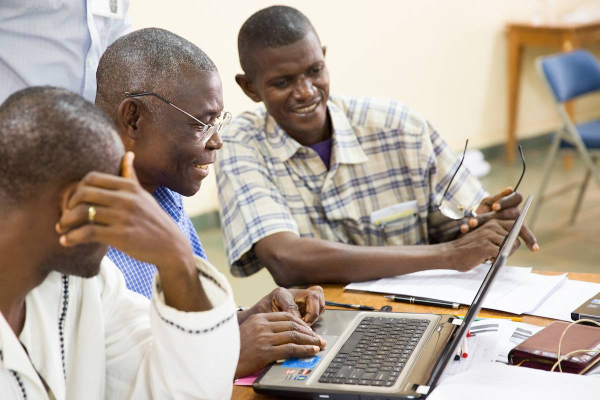6 Steps to Overcome Comparison and Develop Healthy Humility

“Someone else could do my job way better.”
“I could never do what that missionary does.”
“Everyone here is smarter than me.”
Have you ever had these thoughts? Whether it’s thinking about your gifts, skills or level of education, it can be easy to compare yourself to others. When you fall into this trap of thinking, you might feel hesitant to move forward, even when God opens doors for you. Annette Pedersen joined Wycliffe in 2014 after working in a private counseling practice for seven years as a licensed professional counselor. Below she shared six steps for how you can overcome comparison and boldly follow God — wherever he leads you.
1. Understand True Humility
For you are all children of God through faith in Christ Jesus. — Galatians 3:26 (NLT)
Annette explained that the first step to overcome comparison is to understand what it means to have a healthy balance of both humility and confidence. At Wycliffe, you might be on a video call with a missionary who has a doctorate degree or sit next to a leader with many years of experience serving in cross-cultural settings.
If you compare yourself to other people, no matter where you work, you might feel like you aren’t good enough to belong there. But feeling inferior is not the same as being humble.
Annette said, “True humility is an accurate self-perception. You [need to] agree with God [about] how he sees you.” And that connects with Annette’s next point of advice.
2. Ground Yourself in Christ
For we are God’s masterpiece. He has created us anew in Christ Jesus, so we can do the good things he planned for us long ago. — Ephesians 2:10 (NLT)
You can develop an accurate perception of who you are in Christ by actively pursuing a relationship with God and staying grounded in Scripture. Rest in what Scripture says about who you are, and you’ll experience healing as God transforms your life through his Word.
When you no longer depend on comparing yourself to others in order to determine your worth, you can be both humble and confident. Annette said, “[You will have] a sense of security because you know who you are … [and] where he's put you and what he thinks of you.”
3. Know Your Strengths
In his grace, God has given us different gifts for doing certain things well. — Romans 12:6a (NLT)
What are your skills, talents or gifts? Identifying your strengths is all about using them as resources and seeing those strengths as things God has given you to steward. There will always be more you can do, ways you can improve and someone who can do the job better than you.
But Annette pointed out, “You are responsible for what’s given to you.” So instead of focusing on what God has gifted other people with, focus on how to best steward the skills, talents and resources that he’s given you. Doing this will help prevent comparison and lead you to develop a healthier perspective not only about your own gifts but the gifts of others too.
5. Monitor Your Thoughts
And now, dear brothers and sisters, one final thing. Fix your thoughts on what is true, and honorable, and right, and pure, and lovely, and admirable. Think about things that are excellent and worthy of praise. — Philippians 4:8 (NLT)
The next time you start to feel like you’re not good enough or don’t belong, stop and ask yourself why. Annette said, “It may seem counterintuitive [to give] that initial feeling some validation [but it] usually brings the intensity down.”
Just like it’s important to monitor your physical health, monitoring your thoughts and questioning where they come from is important. Is there a specific reason or feeling behind the thought? Keep in mind that you may be influenced by a variety of factors, both internal and external. Annette pointed out, “[There may be a] difference between how you feel and what the facts are.”
External realities like a lack of sleep, inadequate hydration, hunger or even an illness can impact your thought processes. That is why it is crucial to prioritize your emotional, mental and spiritual health as you grow into the person God wants you to be.
5. Talk to a Friend
If one person falls, the other can reach out and help. But someone who falls alone is in real trouble. — Ecclesiastes 4:10 (NLT)
Communities can be messy, but allowing people to come alongside you in your journey will help you rely on and learn from each other. Focus on building deep relationships with people who can offer wisdom and encouragement.
Do you have a close friend to keep you accountable if you’re thinking too highly of yourself? Who can you trust to help you understand your value in Christ when you feel inadequate? Annette said, “Close connection with other people who can speak into the things they see [and] that you can’t see … [is very important].”
6. Depend on God
For God is the one who provides seed for the farmer and then bread to eat. In the same way, he will provide and increase your resources and then produce a great harvest of generosity in you. — 2 Corinthians 9:10 (NLT)
Your work performance and professional knowledge have the potential to affect how you view your worth, so it’s important to depend on God in both your strengths and weaknesses.
Spend some time reflecting on stories of God’s faithfulness to people who have boldly and tenaciously followed him. Stories about the work that other people have done in God’s global mission can be encouraging. As you listen to or read stories of missionary journeys, remember that God uses people from different backgrounds and experiences to serve him in his Kingdom work.
Although you may not always know what will come next in your own story, God does and he will continue to lead you and provide for you. And when you follow God’s lead, you’ll find rest knowing that you are in the right place. Annette said, “It doesn’t mean work is not exhausting, but there's … joy that comes with it.”
Reflection
As you work to overcome the habit of comparing yourself to others, you’ll need to seek true humility, ground yourself in Christ, know your strengths, monitor your thoughts, talk to a trusted friend and depend on God. Practicing these six steps will help you develop a healthy balance of humility and confidence in every area of life.
Learn more strategies for achieving positive mental health in our webinar, “Positive Mental Health Strategies in Cross-Cultural Ministry.”






